
учебный год 2023 / Stöcker, Stürner, Flexibility, Security and Efficiency of Security Rights over Real Property in Europe. Vol. III
.pdf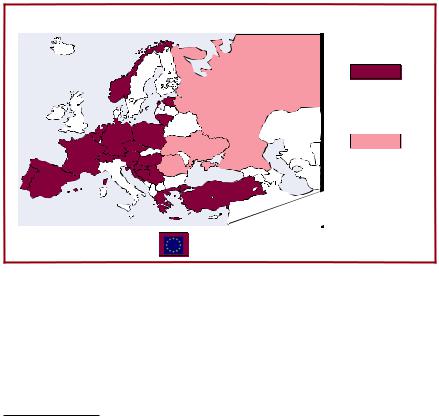
Commentary on the slides |
49 |
Another important disadvantage in practice may concern the efficiency of any enforcement proceedings. As the capital is only a maximum amount, prevailing opinion in, e.g. Germany is that a maximum amount hypothec cannot be declared to be for immediate execution. This means that the possibility provided in principle in many legal systems for the owner to submit to immediate execution with effect in rem for each future owner (e.g. by means of a notarially recorded declaration) does not exist. Thus, the bank must in principle first of all obtain title by litigation before it can institute compulsory enforcement proceedings. However, many legal systems are not affected by such restrictions, e.g. where each notarially authenticated mortgage deed is executable by operation of law without any further action. The matter of the actual amount of the claim is then determined in accordance with the general rules on the allocation of the burden of proof in relation to the accrual and expiry of claims.
III.2 |
Is it possible to register a higher amount for the security right over real property |
|
than the size of the secured claim? (accessoriness of scope) |
2
yes
1
no
 JP
JP
Eurohypothec according to Basic Guidelines:
3.Is the creditor of the secured claim by operation of law always the mortgagee? (accessoriness of competence)
This accessoriness of competence can more easily be regarded as an essential core element of the classic accessory mortgage than the other two effects of accessoriness analysed above. It is at least generally accepted that a divergence in the position of mortgagee and holder of the secured claim is not compatible with the principle of accessoriness.81
81For the German Hypothek Staudinger/Wolfsteiner (2002), Preliminary note 7 on section 1113 et seq. with further references; Baur/Stürner, Sachenrecht [Law of Property], 18th ed. 2009, section 37 marginal note 11. The reference in Becker-Eberhard is, however, interesting: Die Forderungsgebundenheit der Sicherungsrechte [The binding nature of the claim towards security rights], Bielefeld 1993, p. 329 et seq.; it is stated here that no justification for the identification rule is to be found in the materials on the BGB; he is of the view that the binding nature of the claim and divergence between proprietorship of the security right and creditorship of the secured claim go very well with each other (p. 331). Similarly, along ago as 1891 Dernburg, p. 61: “An advantage that its independence gives the Grundschuld is that a different creditor to the personal creditor may be registered as the Grundschuld creditor, who can then enforce the Grundschuld as fiduciary. … Certainly a “Hypothek” can be established in the same way; for it is not to be expected that the proposition of “gemeines Recht” (19th centrury German law) whereby a Hypothek can only be granted to the personal creditor also applies to the modern
Hypothek.”
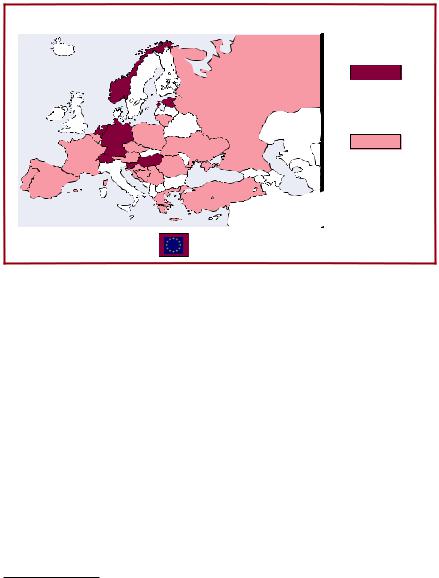
50 |
Commentary on the slides |
This applies both in relation to the creation and the transfer of an accessory mortgage. The maximum amount hypothec thus displays its limited flexibility particularly in the case of a transfer to a new creditor because here the accessoriness applies in the form of accessoriness of competence and does not allow the separation of the security right over real property from the claim. Consequently the claim and the security right over real property must, in principle, be transferred together and claims that are not transferred along with the security right over real property are no longer secured in rem. The broad flexibility within the accessoriness of origin and, particularly, the accessoriness of scope are thereby again restricted. This hampers syndication and accomplishment of the case situations mentioned in C.VII.10. and 11.
III.3 |
Is the creditor of the secured claim by operation of law always the mortgagee? |
|
(accessoriness of competence) |
2
no
1
yes
 JP
JP
Eurohypothec according to Basic Guidelines:
4.Can the security right over real property only be enforced if the secured claim can be enforced?82 (accessoriness of enforcement)
The accessoriness of enforcement ought to play a greater role in the overall view of the legal doctrine than is usually the case, unfortunately. It may, admittedly, not be of material importance in the view of credit institutions. But it is perhaps the most important element of in rem liability from the owner’s point of view if he has to defend himself against unjustified enforcement proceedings. The possibility on the part of the owner to prevent the enforcement of the registered security right over real property where a secured claim is lacking is, from the point of view of legal policy, an important factor on which assessment of the whole system of the statutory regulation of mortgages as balanced and fair depends.
It can be stated in respect of all the legal systems examined, both in relation to accessory and non-accessory mortgages alike, that an owner can defend himself against execution under the mortgage if a secured claim is lacking. However, it must be taken into account in relation to this that the conflict of interest between protection of the transaction and protection of the owner is resolved quite differently. This becomes apparent when the mortgage is transferred, i.e. when there is a change of
82In this regard the question as to whether the enforcement of the mortgage continues to be possible when the claim has become time barred or is inhibited by the time barring of the claim is not considered here.

Commentary on the slides |
51 |
creditor, and this is wholly irrespective of whether the mortgage is constructed as accessory or non-accessory. In the case of the accessory mortgage, (good faith) acquisition without a claim can be permitted and in the case of the non-accessory mortgage, (good faith) acquisition free of the defence under the security agreement can be excluded, as has recently been introduced in Germany.83
In the course of modernising the finance industry and the lending system it was realised some hundred years ago in Europe that too close a link between loan and security right over real property is a constraint on the flexibility of the credit relationship and also hampers funding. Many lawmakers in Europe have therefore considered how they can make mortgages more flexible and, in particular, more easily transferable in order to improve their national lending system. The same interests have always been in conflict here:
•Low cost loans should be facilitated, which necessitated a workable mortgage in order to minimize risk – the law on mortgages and the land register addressed this.
•Third party acquisition of loan claims and mortgages should be made easier for funding purposes – in the law on mortgages and the land register the priority topics of pleas/defences, transferability and the issuing of a deed were involved.
•Protection of the owner/debtor against unjustified compulsory measures should be ensured – this addressed the question as to how the owner can enforce his justified pleas or objections in execution proceedings and how he can safeguard himself against surprise execution.
The national objectives of the individual legislative measures naturally had consequences for the setting of priorities among often completely conflicting interests. When faced with the impact of wretched experiences of a huge demand for capital that could scarcely be satisfied, e.g. for the (re-)development of their country after a war or during an intensely competitive phase of industrialisation, lawmakers focussed on strengthening the legal position of capital investors who were prepared to make a loan or acquire a mortgage from a mortgagee. If one bears in mind the obstacles that had to be overcome in earlier centuries in relation to money and capital movements without an elaborate and comprehensive banking system, without a bank supervisory authority and without a cashless payment system, it is understandable that paramount importance was attached to the mortgage deed when the large-scale monetary economy was in its infancy; and with regard to the matter of pleas and defences following sale and transfer of mortgages, it is understandable that the example of the earlier developed bill of exchange could be seen as very attractive.
In addition, the problem of protection of reliance in the land register and records must be considered in relation to the subject of accessoriness of enforcement and must be included in the assessment.84
83Cf. section 6 RisikobegrenzungsG [Law on Risk Mitigation] of 12.8.2008, BGBl. (Federal Law Gazette I) 2008, 1666 et seq., inserted into the BGB by section 1192 subsection 1a. On this see also C.IV.1.
84Cf. section 6 RisikobegrenzungsG [Law on Risk Mitigation] of 12.8.2008, BGBl. (Federal Law Gazette I) 2008, 1666 et seq., inserted into the BGB by section 1192 subsection 1a.
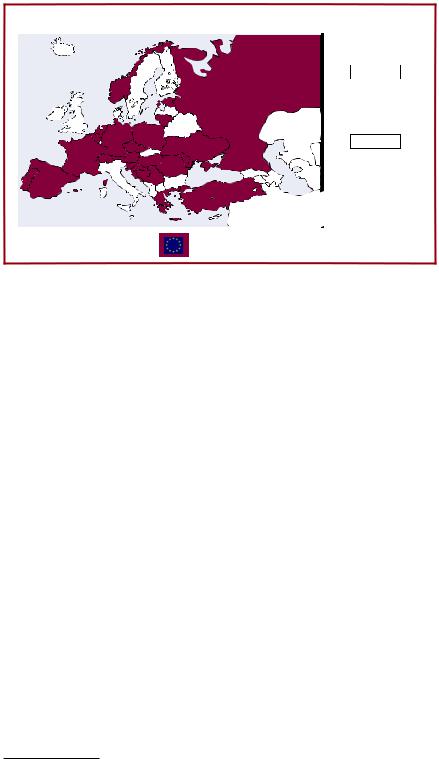
52 |
|
|
Commentary on the slides |
||
III.4 |
Can the security right over real property only be enforced if the secured claim |
||||
|
can be enforced? (accessoriness of enforcement) |
||||
|
|
|
|
||
|
|
|
|
|
2 |
|
|
|
|
yes |
|
|
|
|
|
||
|
|
|
|
|
1 |
|
|
|
|
no |
|
|
|
|
|
||
|
|
|
|
|
|
 JP
JP
Eurohypothec according to Basic Guidelines:
5.Does the extinguishment of the secured claim lead to the extinguishment of the security right over real property by operation of law? (accessoriness of extinguishment)
Full accessoriness of extinguishment is only preserved with security rights over real property that are strictly accessory in existence, which are found less and less often in practice and in many countries have disappeared completely.
Many legal systems go as far as maintaining the in principle “accessory” maximum amount hypothec when the secured claim or all secured claims are fully extinguished. The maximum amount hypothec thereby becomes non-accessory as regards the accessoriness of extinguishment. This applies, for example, in the case of the Dutch bank hypothec and the Austrian maximum amount hypothec which, moreover, can secure a multiplicity of variable claims.
A distinction must be drawn between the question as to whether the security right over real property is extinguished with the claim and the additional question as to whether the creditor nonetheless still has the possibility of taking compulsory measures against the debtor. The accessoriness of extinguishment of the security right over real property is frequently inferred in order to make it impossible for the creditor to institute – certainly then unjustified – compulsory enforcement. However, the possibility of levying execution against a property is, in fact, often solely dependent on whether the security right over real property is still registered.85 Irrespective of how the accessoriness of extinguishment is regulated, lack of authority to institute compulsory enforcement because a claim does not exist or no longer exists must then be asserted by the owner by judicial means, as the onus of initiating proceedings lies with him.
85 This is the outcome of the provisions on public reliance in the land register, cf. C.II.16. et seq.
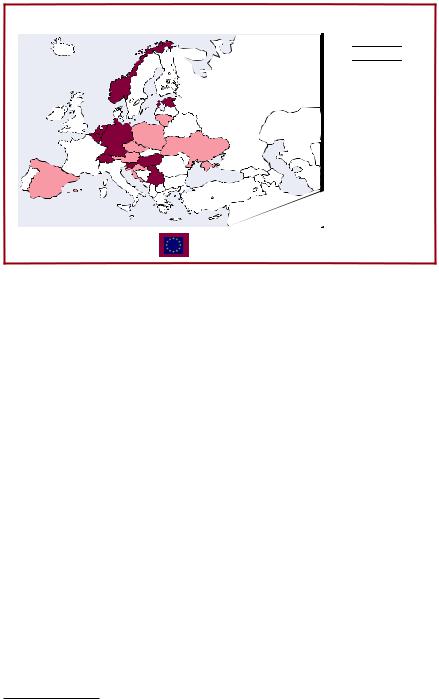
Commentary on the slides |
53 |
|
III.5 Does the extinguishment of the secured claim lead to the extinguishment of the security |
|
|
right over real property by operation of law? (accessoriness of extinguishment) |
|
|
|
|
|
|
|
3 |
|
no |
|
 2
2
not if further claims may arise from the legal foundation
1
yes
 JP
JP
Eurohypothec according to Basic Guidelines:
6.Is the security right over real property linked to the secured claim by a security agreement on the scope of the secured claims?
A security agreement that contains an obligation to create a security right over real property as security is the basis of every security right over real property, whether accessory or non-accessory, because otherwise the security right over real property would be obtained without legal cause.86 Another question is whether causa and the formation agreement are united or are separate. Legal systems answer this question differently according to their fundamental starting point (single contract for obligation and disposition or separation principle). With a non-accessory security right over real property or, as often is the case, where there is relaxed accessoriness, the security agreement also has the additional function, however, of establishing the legal relationship between the secured claim and the security right over real property: ascertainment of claims involved, termination of the security relationship, the owner’s rights of defence in the event of enforcement of the security right over real property contrary to contract etc.
86On this and the following point Soergel/Stöcker, EU-Osterweiterung und dogmatische Fragen des Immobiliarsachenrechts – Kausalität, Akzessorietät und Sicherungszweck [Eastward expansion of the EU and doctrinal issues of real property law – Causality, Accessoriness and Purpose of Collateral], ZBB 2002, 412 et seq.; further, Baur/Stürner, Sachenrecht [Law of Property], 18th ed. 2009, section 5 marginal note 40 et seq., section 36 marginal note 76a et seq., section 45 marginal note 9 et seq.
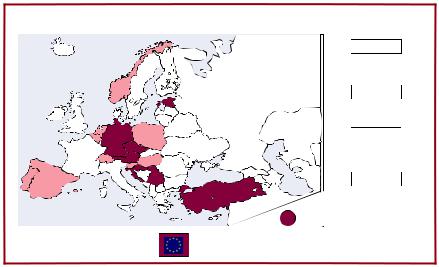
54 |
|
|
Commentary on the slides |
||||
III.6 |
Is the security right over real property linked to the secured claim by a |
||||||
|
security agreement on the scope of the secured claims? |
||||||
|
|
|
|
|
|
|
|
|
|
|
|
|
|
4 |
|
|
|
|
|
|
|
||
|
|
|
|
yes, mandatory by law |
|||
|
|
|
|
|
|||
|
|
|
|
|
|
3 |
|
|
|
|
|
yes, customary practice |
|||
|
|
2 |
|||||
|
|
|
|
yes, seen as tacitely |
|||
|
|
|
|
|
agreed |
||
|
|
|
|
1 |
|||
|
|
||||||
|
|
|
|
not necessary due to |
|||
|
|
|
|
|
legal accessoriness |
||
|
|
|
JP |
|
|||
|
|
|
|
|
|
|
|
Eurohypothec according to Basic Guidelines:
7.How can subordinate (junior) mortgagees or unsecured creditors acquire the position of the free parts of the first ranking mortgage?
Real estate financing frequently requires the cooperation of several credit institutions who in each case receive their own mortgages with differing ranking. For subordinate mortgagees the question arises as to whether and how they can take over the position of a prior ranking creditor. In most legal systems this is possible contractually (e.g. by assignment of the rank) or through statutory succession by way of promotion to a higher position upon repayment of the prior ranking secured claims.
In most legal systems it is also possible for unsecured creditors to obtain a security right on a plot of land by means of enforcement. This provides a compulsorily registered mortgage but it is, of course, subordinate in rank in relation to mortgages that have already been registered. In many countries where only the accessory mortgage is known, this position may improve over time: if, for example, a prior ranking secured claim is repaid, the prior ranking mortgage is thereby reduced in extent and the compulsorily registered subordinate mortgage in this way achieves an upgrading effect through promotion to a higher position.
Other legal systems do not, however, provide for such promotion to a higher ranking position but instead grant the owner himself a right in the parts of a prior ranking mortgage that become free following repayment of the claim. This is also described as the “fixed rank system”. In these countries the position of the subordinate creditor thus does not automatically improve with the repayment of the prior ranking mortgage. Instead, however, there is, potentially, the possibility of acquiring the legal position of the owner in the prior ranking secured mortgage. The owner achieves an increasing position in the prior ranking secured mortgage with amortisation (in Germany in the form of the right to restitution [Rückgewähranspruch] – comparable to the equity of the redemption in English law) and this position may be acquired
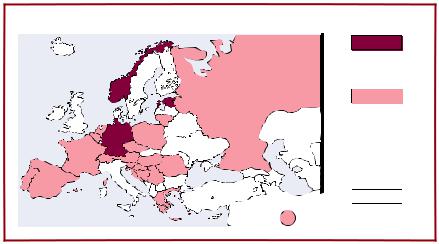
Commentary on the slides |
55 |
either contractually in advance or also by later pledging. The subordinate creditor then has an effective possibility of enforcement as he acquires an existing, better ranking mortgage without having to create and register a new mortgage.
It is noticeable, however, that countries with non-accessory mortgages do sometimes make reference to ranking promotion but in the case of non-accessory mortgages such ranking promotion can be frustrated by the ever possible renewal of an existing loan facility. A similar position of conflict can arise in relation to maximum amount hypothecs.
III.7 |
How can subordinate (junior) mortgagees or unsecured creditors acquire |
|
the position of the free parts of the first ranking mortgage? |
4
the owner‘s right to those parts of the security right not (no more) needed for the secured claim can be assigned or seized / garnished
3
it is only possible to register subordinate rights which then (economically) advance in ranking
 2
2
it is not possible to be secured on the real property, but to participate in the proceeds
1
only by agreement
JP
56 |
Commentary on the slides |
IV. Protection of the owner
For many years aspects of consumer protection have been increasingly central to the interests both of many national legislatures but particularly also of the European Commission with the development of new regulations applicable across the European Union providing minimum standards of protection. In the area of real property law and mortgages the owner of the property is regarded as being in need of protection. It must be taken into account at the same time, however, that as a rule real property law in Europe does not differentiate according to the person of the owner. Whether he is a consumer or not an owner’s rights against unjustified enforcement action by a mortgagee are always the same.
The closest link between secured claim and security right over real property is exhibited by mortgages that are strictly accessory in existence, where extinguishment of the secured claim leads by operation of law to the extinction of the security right over real property. The strictly accessory mortgage is therefore frequently described as consumer-friendly, whereas non-accessory mortgages are criticised as being risky for the consumer. This is, in these over-simplified terms, not correct. Protection of the consumer (in relation to the mortgage: the owner of the property) cannot be restricted to the substantive law issue of the continued existence of the security right over real property in the absence of a claim, under which action could be taken in the context of an enforcement. Much more relevant are procedural questions about the allocation of the burden of proof, the possibility of contractual defence under the security agreement or good faith “disacquisition” under substantive law of pleas or defences due to the absence of a secured claim. Depending on how these issues are regulated in a legal system, a non-accessory mortgage can be by all means less “risky” for the owner than an accessory mortgage.
As could be stated in C.III.4., the principle of accessoriness of enforcement applies everywhere, though in many countries there are regulations that serve transactional interests by making the transfer of mortgages easier. These facilitate the good faith acquisition, free of pleas and defences, of a security right over real property or at least pass on the burden of proof in many cases to the owner. The following slides and also slide C.V.4. deal with this.
1.Can the owner object that there is no secured claim due if the acquirer of the security right over real property is in good faith?
Whereas in C.II.18. above the question of reliance on the accuracy of the land register was addressed in relation to the case where someone other than the registered holder is entitled to an existing mortgage, the question being looked into here is whether the protective effect of the land register also extends to the case where the claim secured by the security right over real property is lacking.
In credit practice the good faith acquisition of security rights over real property without claims may well happen only rarely. But for an acquiring credit institution it is important to know during the process of the transfer of a mortgage what legal facts have to be investigated in order to minimise the risk of acquiring a security

Commentary on the slides |
57 |
right over real property that cannot be enforced – and this in turn determines both the relevant operational time and costs expended in connection with credit checking and also the likelihood of the risk of not even having acquired a right at all, which in turn represents a factor in risk management and in the calculation of margin. The credit institution must address these issues with particular care when, in implementation of Basel II, it chooses the Internal Ratings Based Approach (IRBA) for risk weighting and capital requirements.87
From a legal policy point of view the issue of the risk of a double demand under the loan claim and the security right over real property attracts the greatest attention. In fact, cases of this type happen very seldom in practice. The discussions about the Eurohypothec have shown, however, that the basic doctrinal issue of the degree of accessoriness of a mortgage is often largely discussed against the backdrop of this risk. But the risk of a double demand was properly based not on the non-accessoriness of, for instance, the earlier German Grundschuld, but on the previous possibility of the good faith acquisition, free of pleas and defences, of a mortgage generally, so that this risk applied in equal measure in respect of the conventional mortgage [Verkehrshypothek] and the Grundschuld.88 In the meantime, in 2008, the German legislature has largely excluded the good faith acquisition of a Grundschuld without the existence of a claim, though not, however, the good faith acquisition of a conventional mortgage without the existence of a claim.89 Nothing could demonstrate more convincingly how little the risk of a double demand depends on fundamental accessoriness or non-accessoriness.
However, this does not mean that the risk of a double demand does not exist where the law does not give the option of acquisition in good faith. This is because issues concerning the allocation of the burden of proof are also relevant in this regard. In many countries with accessory security rights over real property it is customary for the bank to have the disbursement of the loan (notarially) attested in a mortgage deed; only then does disbursement take place.90 This, to some extent, achieves a similar effect as is achieved with the creation of a non-accessory Grundschuld prior to disbursement of the loan which, in the view of the financing bank, may be completely legitimate and necessary. Advocates of the consumer protection effect of the strict accessoriness of a mortgage, however, as a general rule do not respond to this widespread practice.
In conclusion, it can be seen in relation to the legal systems examined, that in this situation of conflicting interests most of them more readily protect the owner, others, however, the mortgagee.
87Cf. D.I.2.
88On this see Baur/Stürner, Sachenrecht [Law of Property], 18th ed. 2009, section 36 marginal note 76a et seq., and section 45 marginal notes 61 et seq. and 67a et seq.; further, Kircher, Grundpfandrechte in Europa [Mortgages in Europe], p. 295 et seq. and p. 391.
89In detail on the new law Baur/Stürner, section 45 marginal note 67a et seq. Stürner, Festschrift für Dieter Medicus zum 80. Geburtstag, 2009, p. 513 et seq.; Nietsch NJW 2009, 3606; Langenbucher NJW 2008, 3169, 3172; Habersack NJW 2008, 3173, 3176.
90Cf. C.V.4.
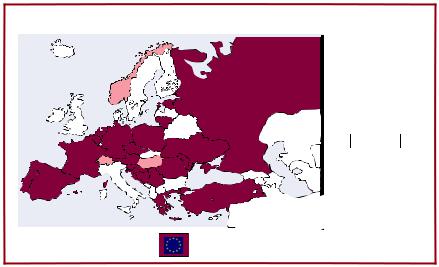
58 |
|
|
Commentary on the slides |
||
IV.1 |
Can the owner object that there is no secured claim due if the |
||||
|
acquirer of the security right over real property is in good faith? |
||||
|
|
|
|
|
|
|
|
|
|
|
2 |
|
|
|
|
yes |
|
|
|
|
|
(owner protected) |
|
|
|
|
|
||
|
|
|
|
|
1 |
|
|
|
|
no |
|
|
|
|
|
||
|
|
|
(mortgagee protected) |
||
|
|
|
|
|
|
 JP
JP
Eurohypothec according to Basic Guidelines:
2.Is it possible for the owner to have the registered amount of the security right over real property reduced when it is clear that only a part of the set maximum amount of the security right over real property will be used?
Many legal systems provide the possibility for the capital sum of the security right over real property to be reduced, in accordance with repayment, in the land register or on the deed, and the creditor is obliged to cooperate. In this way the owner is protected against unjustified action on the part of a mortgagee, which can be of particular importance with security rights where good faith acquisition of a security right over real property without the existence of a claim is possible. In practice, however, in making his decision as to whether he should make use of this right, the owner should weigh the rather theoretical risk of good faith acquisition against the loss of the flexibility of his security right. Higher costs could arise later if the creditor, for example, wishes to augment his loan.
What is surprising is that several legal systems only permit a reduction when the secured claim has been completely repaid, for in this case the security right over real property could also be completely cancelled. In these countries a reduction is also not possible in face of the creditor’s opposition as long as any residual debt exists.
